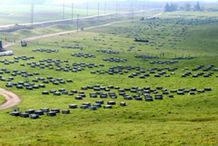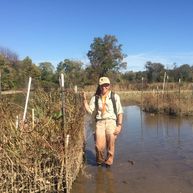 Image Credit: vanEngelsdorp bee lab Image Credit: vanEngelsdorp bee lab Congratulations to Nathalie Steinhauer, Kelly Kulhanek, Karina Antúnez, Hannelie Human, Panuwan Chantawannakul, Marie-PierreChauzat, and Dennis vanEngelsdorp whose article, “Drivers of colony losses” has been published in Current Opinion in Insect Science. Check out the full article at https://doi.org/10.1016/j.cois.2018.02.004. New Publication: Stress-induced pyruvate accumulation contributes to cross protection in a fungus2/14/2018
Congratulations to Xing Zhang,Raymond J St. Leger and Weiguo Fang, whose article, “Stress-induced pyruvate accumulation contributes to cross protection in a fungus” was recently published in Environmental Microbiology.
This study examines mechanisms for cross protection in microorganisms. Check out the full article at http://onlinelibrary.wiley.com/doi/10.1111/1462-2920.14058/full. Congratulations to Amanda L Buchanan and Cerruti R R Hooks on their recent publication in Environmental Entomology titled “Influence of Winter Cover Crop Mulch on Arthropods in a Reduced Tillage Cucurbit System.” Check out the full report at https://doi.org/10.1093/ee/nvy004
Last month Atlanta-based pest control company Orkin released its "Top 50 Bed Bugs Cities" report, listing Baltimore and Washington as leading cities in bedbug infestations. In response, Direct Connection on Maryland Public Television aired expert advice from Dr. Michael Raupp on protecting your home from bedbugs. Congratulations to Jessica L. Nelson, Lauren G. Hunt, Margaret T. Lewis, Kelly A. Hamby, Cerruti R.R. Hooks, Galen P. Dively on their recent paper in Agriculture, Ecosystems & Environment titled “Arthropod communities in warm and cool grass riparian buffers and their influence on natural enemies in adjacent crops.”
This study examines arthropod communities in riparian grass buffers, with a focus on their effect on natural enemy populations within neighboring crops. Check out the full article https://doi.org/10.1016/j.agee.2018.01.019. Congratulations to the recipients of the Spring 2018 Ernest N. Cory Undergraduate Scholarship! This scholarship provides up to $1,000 for undergraduate students each semester who have creatively contributed to Entomology Department research and/or extension efforts. Be sure to check back in to read more about their research progress!  Lyra Morina is a University Honors junior Biological Sciences: Cell Biology & Molecular Genetics and Economics dual degree. Working with Culex pipiens mosquitoes in the Fritz Lab for over a year, she began her own research project studying Wolbachia induced Cytoplasmic Incompatibility (CI) in Culex pipiens pipiens and molestus through the Cell Biology & Molecular Genetics Departmental Honors Program. By linking incompatibility patterns to the unique Wolbachia endosymbiont strains the mosquitoes harbor, the Wolbachia genes inducing these effects on embryonic development can be investigated. Lyra aims to pursue a PhD within Cell Biology and Molecular Genetics and continue her career path in biological research and academia. She also hopes to apply her background in economics to quantifying the impact of biological research outcomes on public health, environmental issues, and other social phenomena.  Lily Durkee has been working with the Gruner Lab since the summer before her senior year of high school. It was because of this incredible experience that summer that she decided to attend UMD as an undergraduate student and pursue a degree in Ecology and Evolution. Currently, she is working towards completing an Honors Thesis within the Department of Entomology that focuses on assessing the effects of restoration strategies on the macroinvertebrate benthic communities in Anacostia Park marsh systems. After she graduates next spring, she plans on attending graduate school to pursue a PhD in entomology, ecology, or natural resource management.  Chloe Garfinkel is a senior biology major with an ecology and evolution concentration and a sustainability minor. She has worked in the Lamp lab since the summer after her freshman year at Maryland. She is working on an independent research project on the damselfly Calopteryx maculata to determine the effect of habitat on adult size and nutritional content. She has volunteered at and planned the lab's Maryland Day event 'Discover a Swamp,' where children can collect insects from an artificial swamp. She has just finished applying to graduate school and in the future, she hopes to pursue interests in both biology and education.  Bijal Kikani research in the Pick lab focuses on investigating the role of pair rule genes in Drosophila melanogaster to better understand their roles during embryonic development. Particularly, she is searching for binding partners of a nuclear hormone receptor, Ftz-F1, to understand how gene regulation is controlled. Through the use of western blots, co-immunoprecipitation assays, and mass-spectrometry, she hopes to narrow down candidate binding partners of this nuclear receptor and verify these genes using RNA interference experiments. She says her exposure to this lab has increased her skills in molecular genetics and she hopes to continue to strengthen these skills through further exposure in the research field.  Ebony Argaez The Pick lab uses Drosophila melanogaster, a long germ insect, to investigate the regulatory genes and pathways that control embryonic development. Accordingly we sought other long germ insects for comparative studies and we are investigating pair rule genes in the beetle Callosobruchus maculatus. She says with the help of Pick Lab members, she has been able to improve embryo collection and fixation techniques, stage early embryogenesis and isolate a pair rule gene using molecular techniques, including PCR, DNA sequencing, and TA cloning. She hopes to continue doing research and eventually go to graduate school. |
Categories
All
Archives
June 2024
|
Department of Entomology
University of Maryland
4112 Plant Sciences Building
College Park, MD 20742-4454
USA
Telephone: 301.405.3911
Fax: 301.314.9290
University of Maryland
4112 Plant Sciences Building
College Park, MD 20742-4454
USA
Telephone: 301.405.3911
Fax: 301.314.9290

 RSS Feed
RSS Feed




